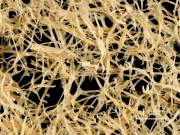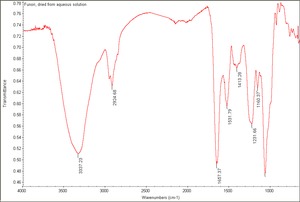Difference between revisions of "Funori"
Jump to navigation
Jump to search
(username removed) |
|||
| (3 intermediate revisions by 3 users not shown) | |||
| Line 2: | Line 2: | ||
== Description == | == Description == | ||
| − | A carbohydrate extract from [ | + | A carbohydrate extract from [[seaweed]], primarily Gelidium or Gracilaria. Funori is a type of [[agar]] that is used as a weak water-soluble [[adhesive]]. It can form a [[gel]] at concentrations as low as 1%. It is primarily composed of [[galactose]] and is similar to agar. The mucilage has a low viscosity and dries to a thin, flexible, matte film. Funori is traditionally used by Japanese scroll mounters as a consolidant for friable media (AIC Book and Paper Catalog). Funori primarily comes from Japan where it has been cultivated since the 17th century (Swider and Smith 2005). |
== Synonyms and Related Terms == | == Synonyms and Related Terms == | ||
| Line 8: | Line 8: | ||
funoran; funori (It); Japanese seaweed adhesive; Halio | funoran; funori (It); Japanese seaweed adhesive; Halio | ||
| − | [[[SliderGallery rightalign| | + | [[[SliderGallery rightalign|Funori, dried from aqueous solution.TIF~FTIR (MFA)]]] |
| − | == | + | ==Physical and Chemical Properties== |
Soluble in water. | Soluble in water. | ||
| − | == | + | ==Resources and Citations== |
| − | + | * Joseph R. Swider, Martha Smith, "Funori: Overvew of a 300-Year-Old Consolidant" JAIC 44(2), pp. 117-126, 2005. | |
| − | |||
| − | |||
* ''A Glossary of Paper Conservation Terms'', Margaret Ellis (ed.), Conservation Center of the Institute of Fine Arts, New York City, 1998 | * ''A Glossary of Paper Conservation Terms'', Margaret Ellis (ed.), Conservation Center of the Institute of Fine Arts, New York City, 1998 | ||
Latest revision as of 14:39, 26 August 2022
Description
A carbohydrate extract from Seaweed, primarily Gelidium or Gracilaria. Funori is a type of Agar that is used as a weak water-soluble Adhesive. It can form a Gel at concentrations as low as 1%. It is primarily composed of Galactose and is similar to agar. The mucilage has a low viscosity and dries to a thin, flexible, matte film. Funori is traditionally used by Japanese scroll mounters as a consolidant for friable media (AIC Book and Paper Catalog). Funori primarily comes from Japan where it has been cultivated since the 17th century (Swider and Smith 2005).
Synonyms and Related Terms
funoran; funori (It); Japanese seaweed adhesive; Halio
Physical and Chemical Properties
Soluble in water.
Resources and Citations
- Joseph R. Swider, Martha Smith, "Funori: Overvew of a 300-Year-Old Consolidant" JAIC 44(2), pp. 117-126, 2005.
- A Glossary of Paper Conservation Terms, Margaret Ellis (ed.), Conservation Center of the Institute of Fine Arts, New York City, 1998
- Book and Paper Group, Paper Conservation Catalog, AIC, 1984, 1989
- John S. Mills, Raymond White, The Organic Chemistry of Museum Objects, Butterworth Heineman, London, 2nd ed., 1994

